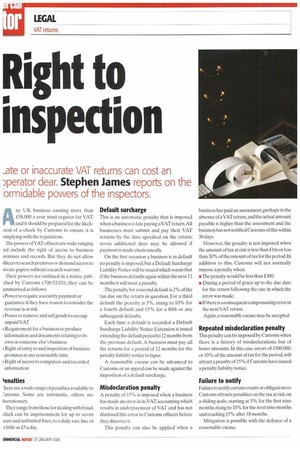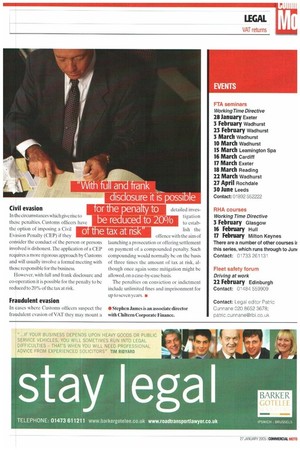Right to inspection
Page 36

Page 37

If you've noticed an error in this article please click here to report it so we can fix it.
_ate or inaccurate VAT returns can cost an
Dperator dear. Stephen James reports on the
brmidable powers of the inspectors.
Aifly UK business earning more than £58,000 a year must register for VAT, and it should be prepared for the likeliiood of a check by Customs to ensure it is omplying with the regulations.
The powers of VAT officers are wide-ranging nd include the right of access to business 'remises and records. But they do not allow ifficers to search premises or demand access to irivate papers without a search warrant.
Their powers are outlined in a notice pub[shed by Customs (700/52/03); they can be ummarised as follows: • Power to require a security payment or guarantee if they have reason to consider the revenue is at risk i Power to remove and sell goods to recoup unpaid VAT i Requirement for a business to produce information and documents relating to its own or someone else's business • Right of entry to and inspection of business premises at any reasonable time i Right of access to computers and recorded information
penalties
here are a wide range of penalties available to 7ustoms. Some are automatic, others are liscretionary.
They range from those for dealing with fraud, vhich can be imprisonment for up to seven 'ears and unlimited fines, to a daily rate fine of s little as £5 a day.
Default surcharge
This is an automatic penalty that is imposed when a business is late paying a VAT retum.All businesses must submit and pay their VAT returns by the date specified on the return; seven additional days may be allowed if payment is made electronically.
On the first occasion a business is in default no penalty is imposed,but a Default Surcharge Liability Notice will be issued which warns that if the business defaults again within the next 12 months it will incur a penalty.
The penalty for a second default is 2% of the tax due on the return in question. For a third default the penalty is 5%, rising to 10% for a fourth default and 15% for a fifth or any subsequent defaults.
Each time a default is recorded a Default Surcharge Liability Notice Extension is issued extending the default period to 12 months from the previous default. A business must pay all the returns for a period of 12 months for the penalty liability notice to lapse.
A reasonable excuse can be advanced to Customs, or an appeal can be made against the imposition of a default surcharge.
Misdeclaration penalty
A penalty of 15% is imposed when a business has made an error in its VAT accounting which results in underpayment of VAT and has not disclosed this error to Customs officers before they discover it.
This penalty can also be applied when a business has paid an assessment, perhaps in the absence of a VAT retum,and the actual amount payable is higher than the assessment and the business has not notified Customs of this within 30 days.
However, the penalty is not imposed when the amount of tax at risk is less than Dm or less than 30% of the amount of tax for the period. In addition to this, Customs will not normally impose a penalty when: &The penalty would be less than £300; • During a period of grace up to the due date for the return following the one in which the error was made; • if there is a consequent compensating error in the next VAT return, Again, a reasonable excuse may be accepted.
Repeated misdeclaration penalty
This penalty can be imposed by Customs when there is a history of misdeclarations, but of lesser amounts. In this case errors of £500,000, or 10% of the amount of tax for the period, will attract a penalty of 15% if Customs have issued a penalty liability notice.
Failure to notify
Failure to notify certain events or obligations to Customs attracts penalties on the tax at risk on a sliding scale, starting at 5% for the first nine months, rising to 10% for the next nine months and reaching 15% after 18 months.
Mitigation is possible with the defence of a reasonable excuse. Civil evasion In the circumstances which give rise to these penalties, Customs officers have the option of imposing a Civil Evasion Penalty (CEP) if they consider the conduct of the person or persons involved is dishonest. The application of a CEP requires a more rigorous approach by Customs and will usually involve a formal meeting with those responsible for the business.
However, with full and frank disclosure and co-operation it is possible for the penalty to be reduced to 20% of the tax at risk.
Fraudulent evasion In cases where Customs officers suspect the fraudulent evasion of VAT they may mount a detailed investigation to establish the offence with the aim of launching a prosecution or offering settlement on payment of a compounded penalty. Such compounding would normally be on the basis of three times the amount of tax at risk, although once again some mitigation might be allowed, on a case-by-case basis.
The penalties on conviction or indictment include unlimited fines and imprisonment for up to seven years. •


































































































































































































